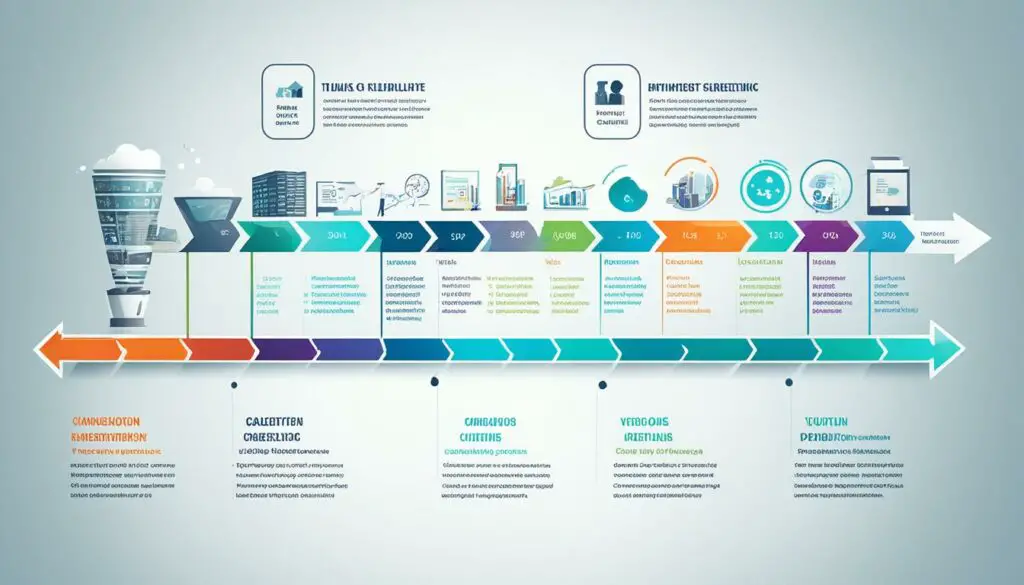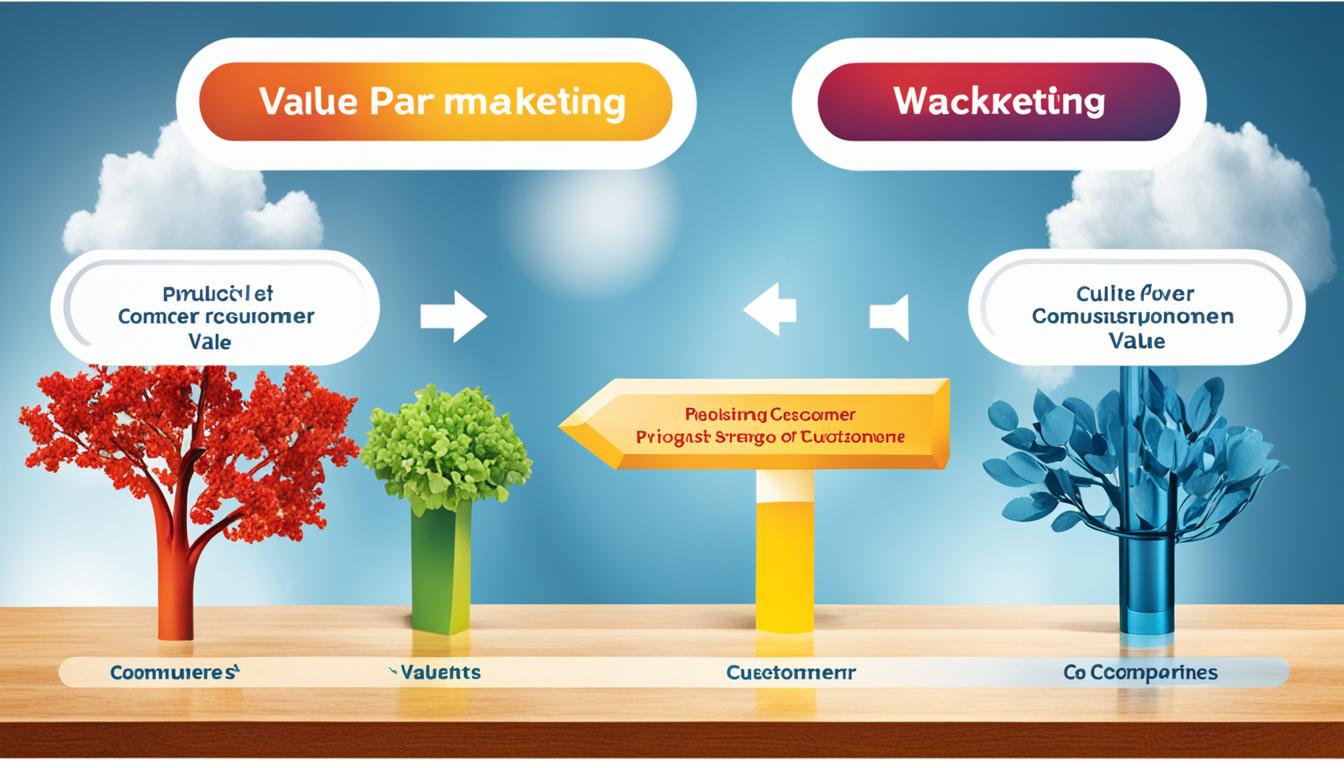Marketing science is a fascinating field that combines the principles of science with the intricacies of marketing. It delves into the world of data-driven marketing and evidence-based strategies to help businesses better understand their customers and optimize their marketing efforts. By leveraging scientific methods, statistics, and consumer behavior analysis, marketing scientists unlock valuable insights that pave the way for success in today’s competitive landscape.
Key Takeaways:
- Marketing science combines scientific methods with marketing principles.
- Data-driven marketing is at the core of marketing science.
- Evidence-based strategies drive effective marketing campaigns.
- Understanding consumer behavior is essential for success in marketing science.
- Optimizing marketing efforts through scientific methods leads to growth.
What is Marketing Science?
Marketing science is the application of scientific methods to understand customer needs and develop effective approaches to fulfill them. It differs from research in the arts or humanities and is primarily focused on seeking empirical truths in the field of marketing. Marketing science is closely related to marketing research, but it encompasses a broader scope.
The Marketing Science Institute and the American Marketing Association are valuable resources for professionals in the field of marketing science. These organizations provide access to research, publications, and conferences that promote the advancement of scientific methods in marketing.
Marketing science incorporates a deep understanding of statistical analysis to draw meaningful insights from data. It often involves survey research, causal analysis, and research design to gather and analyze information. By utilizing scientific methods, marketers can make data-driven decisions and optimize their marketing strategies for better results.
An Example
To illustrate the importance of scientific methods in marketing science, let’s consider a hypothetical scenario of a clothing retailer. The retailer wants to understand the factors that influence customers’ purchasing decisions. By conducting survey research and using statistical analysis, marketing scientists can identify the key drivers that impact consumer behavior, such as price, quality, and brand reputation.
This data-driven approach allows the retailer to tailor their marketing strategies to meet customer expectations and allocate resources effectively. For example, they may find that price is a significant driver for cost-conscious shoppers, whereas brand reputation is more influential for luxury shoppers.
The insights gained from marketing science enable businesses to make informed decisions, optimize their marketing campaigns, and ultimately meet the needs of their target audience more effectively.
Core Knowledge Domains and Skills in Marketing Science
Marketing science encompasses a wide range of knowledge domains and skills that are essential for professionals in the field. A strong foundation in advanced statistics is crucial for conducting rigorous data analysis and drawing meaningful insights. Additionally, proficiency in experimental and non-experimental research designs enables marketing scientists to design effective studies that yield reliable results.
Marketing science also requires a deep understanding of sampling theory, which is essential for selecting representative samples and ensuring the generalizability of research findings. Proficiency in programming languages such as R or Python is valuable for data management and analysis.
Survey research is another key skill in marketing science, as it enables researchers to gather qualitative and quantitative data from target audiences. Proficiency in qualitative research methods such as focus groups or in-depth interviews allows for a comprehensive understanding of consumer behavior.
Critical thinking and analytical skills are essential for interpreting research findings and drawing actionable insights. Marketing scientists should also possess a solid understanding of consumer behavior and marketing knowledge to develop effective strategies and campaigns.
Business understanding is vital for marketing scientists, as it allows them to align their research and strategies with broader organizational goals. Finally, strong presentation and communication skills enable marketing scientists to effectively communicate their findings and recommendations to stakeholders.
Overall, a combination of these knowledge domains and skills is crucial for senior marketing scientists to design and execute impactful research studies, analyze data, and derive actionable insights for evidence-based marketing strategies.
| Skills | Description |
|---|---|
| Advanced Statistics | Mastery of statistical techniques for data analysis and interpretation |
| Research Designs | Expertise in designing experimental and non-experimental research studies |
| Sampling Theory | Understanding of sample selection methods and generalizability of results |
| Programming | Proficiency in programming languages for data management and analysis |
| Survey Research | Ability to design and conduct surveys to gather qualitative and quantitative data |
| Qualitative Research | Skills in conducting focus groups, interviews, and qualitative data analysis |
| Critical Thinking | Ability to analyze research findings, identify patterns, and draw insights |
| Consumer Behavior and Marketing Knowledge | Understanding of consumer behavior theories and marketing principles |
| Business Understanding | Insight into organizational goals and alignment of research with business objectives |
| Presentation and Communication Skills | Ability to effectively communicate research findings and recommendations |
The Role of Marketing Science in Data-Driven Marketing
Marketing science plays a crucial role in driving data-driven marketing strategies. By leveraging marketing analytics, marketers can analyze data and draw valuable insights to make informed decisions. Marketing scientists, with their expertise in statistics and experimental research designs, are instrumental in identifying patterns and trends in consumer behavior. This invaluable knowledge helps in the development of effective marketing strategies.
To optimize marketing campaigns, marketing scientists conduct precise marketing experiments. These experiments allow them to test hypotheses and optimize various aspects of marketing campaigns, such as messaging, targeting, and creative elements. By utilizing data-driven strategies and conducting marketing experiments, marketers can continually improve their marketing efforts and achieve better results.
One of the major advantages of marketing science in data-driven marketing is its ability to uncover valuable insights through statistical analysis. Through marketing analytics, marketers can assess campaign performance, measure customer engagement, and track key performance indicators (KPIs). These insights empower marketers to make data-backed decisions, optimize marketing budgets, and allocate resources effectively.
Furthermore, marketing science enables marketers to analyze consumer behavior, understand their preferences, and anticipate their needs. It provides actionable insights into customer segments, allowing businesses to tailor their marketing strategies and offerings accordingly. This targeted approach ensures that marketing efforts are relevant and resonate with the intended audience, driving higher engagement and conversion rates.
Benefits of Marketing Science in Data-Driven Marketing:
- Accurate data analysis and insights generation
- Optimized marketing campaigns through precise experimentation
- Improved decision-making through data-driven strategies
- Enhanced understanding of consumer behavior and preferences
- Targeted marketing efforts for higher engagement and conversion
To summarize, marketing science plays a vital role in data-driven marketing by leveraging marketing analytics, conducting experiments, and providing valuable insights. By integrating marketing science into their strategies, marketers can optimize campaigns, understand consumer preferences, and make informed data-backed decisions, resulting in more effective and impactful marketing efforts.
The Impact of Marketing Science on Consumer Engagement
Marketing science plays a crucial role in understanding and enhancing consumer engagement. By utilizing consumer behavior analysis, marketing psychology, and the insights from neuroscience, marketers can tailor their strategies to effectively connect with their target audience and drive engagement.
Consumer Behavior Analysis
Consumer behavior analysis allows marketers to gain a deep understanding of how consumers make decisions, what motivates their actions, and how they respond to marketing efforts. By studying consumer behavior patterns and trends, marketers can identify key insights that guide the development of impactful marketing strategies.
Marketing Psychology
Marketing psychology explores the psychological processes that influence consumer behavior. By understanding the psychological factors that drive consumer decision-making, such as emotions, motivation, and cognitive biases, marketers can create persuasive messaging and engaging experiences that resonate with their target audience.
The Role of Neuroscience in Marketing
The incorporation of neuroscience in marketing provides valuable insights into how the human brain processes marketing stimuli and makes decisions. Neuroscience techniques, such as brain imaging and biometric measurements, can unveil subconscious reactions and emotional responses to marketing messages. This understanding helps marketers create more impactful campaigns that resonate on a deeper level with consumers.
To further illustrate the impact of marketing science on consumer engagement, let’s take a closer look at a case study:
| Case Study: Personalized Email Campaign | Key Findings |
|---|---|
| The Objective: | To increase engagement and conversion rates for a skincare brand’s email campaign |
| The Approach: | Utilized consumer behavior analysis to segment the target audience based on purchase history and preferences. Applied marketing psychology principles to tailor email content, visuals, and subject lines to each segment’s specific interests and motivations. |
| The Results: |
|
This case study exemplifies how marketing science, through consumer behavior analysis and an understanding of marketing psychology, can drive significant improvements in consumer engagement. By applying scientific methods to consumer engagement, marketers can create personalized and impactful campaigns that resonate with their audience, leading to increased engagement, conversion rates, and business success.
Unlocking Growth with Evidence-Based Marketing Strategies
Evidence-based marketing strategies are crucial for driving growth in today’s competitive business landscape. By utilizing marketing research and analytics, marketers can gather data and derive actionable insights to inform their decision-making. Marketing science plays a pivotal role in providing the foundation for evidence-based marketing, using scientific methods to gather reliable data and extract meaningful findings. These evidence-based insights are then used to develop effective marketing strategies that have a higher likelihood of success.
By relying on evidence rather than guesswork, marketers can make informed decisions and optimize their marketing efforts. This approach allows businesses to allocate their resources more efficiently and effectively, resulting in improved performance and growth. Evidence-based marketing strategies are grounded in data, ensuring that marketing initiatives are aligned with customer needs and preferences.
Marketing analytics plays a vital role in evidence-based marketing by providing the tools and techniques necessary to analyze and interpret the data. Through advanced statistical analysis, marketers can uncover patterns, trends, and correlations that offer valuable insights into consumer behavior and market dynamics. Marketing analytics enables marketers to measure the effectiveness of their campaigns, identify areas for improvement, and optimize marketing strategies to achieve better results.
The integration of marketing research and marketing analytics is essential for evidence-based marketing. Marketing research encompasses a range of research methodologies, such as surveys, focus groups, and experiments, to gather data directly from consumers. This data serves as the foundation for evidence-based decision-making, providing marketers with valuable insights into consumer preferences, motivations, and buying behaviors.
Marketing analytics, on the other hand, focuses on the analysis of data to uncover actionable insights. It involves the use of statistical techniques, data mining, and machine learning algorithms to identify patterns, predict consumer behavior, and optimize marketing strategies. Marketing analytics provides marketers with a deeper understanding of their target audience, allowing them to tailor their messaging, positioning, and advertising efforts to resonate with their customers.
Overall, evidence-based marketing strategies driven by marketing research and analytics are essential for unlocking growth and achieving business success. By leveraging data-driven insights, marketers can make informed decisions, optimize their campaigns, and better engage with their target audience. Embracing evidence-based approaches in marketing is crucial in today’s fast-paced, data-driven world, where competition for customer attention is fierce.
| Benefits of Evidence-Based Marketing Strategies | Key Takeaways |
|---|---|
| 1. Improved decision-making based on reliable data | • Evidence-based marketing strategies provide a solid foundation for decision-making, reducing the risk of relying on guesswork or assumptions. |
| 2. Optimization of marketing efforts for better results | • By analyzing the data and insights, marketers can identify areas of improvement and optimize their marketing strategies to achieve better outcomes. |
| 3. Alignment with customer needs and preferences | • Evidence-based marketing ensures that marketing initiatives are aligned with customer needs and preferences, resulting in more effective engagement. |
| 4. Enhanced resource allocation and efficiency | • By leveraging evidence-based insights, businesses can allocate their resources more efficiently, focusing on high-impact marketing activities. |
| 5. Competitive advantage in the market | • Evidence-based marketing strategies enable businesses to outperform competitors by leveraging data-driven insights and making informed decisions. |
The Evolving Landscape of Marketing Science
Marketing science is a dynamic field that continuously evolves alongside technological advancements and the availability of big data. The rise of big data has revolutionized the way marketers study consumer behavior, allowing them to uncover broad behavioral patterns and gain insights into individual preferences. Furthermore, the integration of artificial intelligence (AI) and machine learning in marketing science has transformed data analysis and prediction capabilities.
With the advent of big data, marketers can now analyze vast amounts of information to uncover valuable insights. By drilling down from aggregate data to the individual level, marketers can tailor their strategies to target specific consumer segments effectively. This level of granularity has opened up new possibilities and revolutionized the field of marketing science.
The incorporation of AI and machine learning in marketing science has further enhanced marketers’ ability to analyze data and make predictions. These technologies have the power to process large volumes of complex data quickly, enabling marketers to uncover hidden patterns and trends. By leveraging AI and machine learning algorithms, marketers can make more accurate predictions about consumer behavior and develop targeted marketing campaigns that resonate with their target audience.
As technology continues to advance, the field of marketing science will continue to adapt and evolve. The future holds exciting opportunities for marketers as they harness the power of marketing science to unlock new ways of reaching, engaging, and converting customers. The combination of big data and AI will play a pivotal role in shaping the future of marketing, helping marketers stay ahead in an increasingly competitive landscape.

The Evolution of Marketing Science
| Year | Key Advancements |
|---|---|
| 2000 | Introduction of web analytics and the ability to track online consumer behavior. |
| 2010 | Rise of big data and the utilization of data-driven decision-making in marketing. |
| 2015 | Integration of machine learning algorithms for predictive analytics. |
| 2020 | Emergence of AI-powered marketing automation and personalization. |
| Future | Further advancements in AI, machine learning, and data analytics to drive hyper-personalization and real-time marketing. |
Unleashing the Power of Marketing Science in Business
Marketing science has proven to be an invaluable tool for businesses, providing insights into customer needs and preferences. By utilizing scientific methods and data-driven approaches, companies can unlock the power of marketing science to drive business development, enhance management practices, and achieve growth.
Applications in Business Development
Marketing science enables companies to gain a deep understanding of their target market by analyzing consumer behavior and market trends. Through advanced statistical analysis and research methods, businesses can identify customer needs, preferences, and pain points, allowing them to tailor their products and services accordingly.
For example, imagine a tech company that collects and analyzes data on customer preferences and behaviors using marketing science techniques. This allows them to develop new products or refine existing ones based on valuable insights. By aligning their offerings with customer demands, the company can effectively promote business development and expand its market share.
Contributions to Effective Management
Data-driven decision-making is a critical aspect of effective management. With the help of marketing science, businesses can collect, analyze, and interpret data to make informed decisions that drive success.
Marketing science provides businesses with a rigorous framework for evaluating marketing strategies, identifying key performance indicators, and measuring return on investment. By leveraging data analytics, companies can assess the effectiveness of their marketing campaigns, optimize resource allocation, and align their efforts with business objectives.
Let’s consider the example of an e-commerce retailer. By utilizing marketing science tools, such as customer segmentation and predictive modeling, they can gain insights into customer preferences and effectively allocate marketing resources. This data-driven approach enables the retailer to make informed decisions, target specific customer segments, and maximize their marketing impact, ultimately driving revenue growth.
Examples of Marketing Science Applications in Business
| Application | Description |
|---|---|
| Product Development | Analyze consumer needs and preferences to create products that align with customer demands. |
| Market Segmentation | Identify distinct customer segments based on demographics, psychographics, and behavior for targeted marketing. |
| Pricing Strategy | Determine optimal pricing based on customer willingness to pay and competitive market analysis. |
| Brand Management | Measure and optimize brand equity, brand positioning, and brand perception. |
| Customer Relationship Management | Maximize customer lifetime value through personalized marketing and relationship-building strategies. |
By harnessing the power of marketing science in business, companies can gain a competitive advantage, drive growth, and make informed decisions that positively impact their bottom line.
Leveraging Opportunities in Data with Marketing Science
Marketing science plays a crucial role in helping marketers leverage the vast opportunities presented by data. By utilizing advanced data analysis methods, marketing scientists can extract valuable insights and drive informed decision-making. Three key techniques that enable marketers to leverage data effectively are survey research, data integration, and sophisticated analysis methods.
Survey Research: Gathering Valuable Data
Survey research is an essential tool in marketing science that allows marketers to collect valuable data directly from consumers. When properly designed, surveys can provide insights into consumer preferences, perceptions, and behaviors. By leveraging survey data, marketers gain a comprehensive understanding of their target audience, enabling them to tailor their strategies accordingly.
Data Integration: Gaining Comprehensive Insights
In addition to survey research, marketing scientists can integrate survey data with other sources, such as customer records or transactional data. This integration allows for a more comprehensive understanding of consumer behavior. By combining different data sets, marketers can identify patterns, correlations, and trends that may not be apparent when analyzing individual data sources alone.
Sophisticated Analysis Methods: Unveiling Actionable Insights
Marketing scientists employ advanced analysis methods like structural equation modeling and hierarchical linear models to uncover actionable insights from the collected data. These techniques enable marketers to delve deeper into complex relationships and identify the key drivers of consumer behavior. By leveraging these sophisticated analysis methods, marketers can make data-driven decisions and optimize their marketing strategies for maximum impact.
Overall, leveraging opportunities in data with marketing science involves using survey research to gather valuable consumer data, integrating different data sources to gain comprehensive insights, and applying sophisticated analysis methods to unveil actionable insights. By harnessing the power of marketing science, businesses can make informed decisions and drive success in today’s data-rich landscape.

Case Studies: Marketing Science in Action
Marketing science is best understood through real-world case studies. These examples illustrate the practical applications and benefits of marketing science in various industries.
Case Study 1: UX and Satisfaction Study
A software company conducted a UX and satisfaction study using advanced structural equation modeling to drive new product development. By analyzing user feedback and preferences, the company identified key areas for improvement in their software and made data-driven decisions to enhance the user experience.
Case Study 2: Allocation of Marketing Resources
An online retailer used vector autoregressive modeling to effectively allocate their marketing resources and increase revenues. This data-driven approach allowed them to optimize their marketing budget by identifying the most impactful marketing channels and strategies, resulting in improved sales performance.
Case Study 3: Conjoint and Segmentation Study
A credit card company conducted a conjoint and segmentation study to challenge assumptions and improve their marketing strategies. By understanding customer preferences and identifying market segments, the company tailored their marketing efforts to different customer groups, resulting in better customer targeting and increased customer satisfaction.
These case studies highlight the power of marketing science in driving evidence-based decision-making and optimizing marketing strategies. By leveraging techniques such as UX and satisfaction studies, key driver analysis, and segmentation studies, companies can gain valuable insights into their target audience and implement data-driven marketing strategies for better business outcomes.
The Future of Marketing Science
The field of marketing science is constantly evolving, driven by emerging trends and advancements in technology. The future of marketing science holds great potential, with the utilization of big data, the Internet of Things (IoT), and artificial intelligence (AI) expected to shape the industry in significant ways.
Big data, characterized by the massive volume, variety, and velocity of data, offers marketers unprecedented insights into consumer behavior and preferences. By leveraging big data, marketers can identify patterns, trends, and correlations, enabling them to make data-driven decisions and develop targeted marketing strategies.
The IoT, consisting of interconnected devices and sensors, generates vast amounts of data in real-time. This data can be harnessed by marketing scientists to gain a deeper understanding of consumer interactions and preferences. By analyzing IoT-generated data, marketers can create personalized experiences, deliver relevant messages, and optimize customer engagement.
Artificial intelligence, a technology that enables machines to simulate human intelligence and decision-making, has the potential to revolutionize marketing science. AI-powered algorithms can analyze large datasets, extract actionable insights, and predict consumer behavior with remarkable accuracy. Marketers can leverage AI to automate tasks, personalize marketing campaigns, and optimize resource allocation for better results.
With the ever-advancing technology landscape, marketing science will continue to evolve, adapting to new trends and harnessing the power of big data and artificial intelligence. As marketers embrace these advancements, the future of marketing science holds the promise of more sophisticated data analysis, enhanced consumer insights, and optimized marketing strategies.
table {
margin: 0 auto;
border-collapse: collapse;
}
th, td {
padding: 10px;
border: 1px solid black;
}
| Advancements | Potential Impact |
|---|---|
| Big Data | Enables deep consumer insights and data-driven decision-making |
| Internet of Things (IoT) | Enhances understanding of consumer interactions and preferences |
| Artificial Intelligence (AI) | Automates tasks, personalizes campaigns, and optimizes resource allocation |
Conclusion
Marketing science is a dynamic and evolving field that combines scientific methods, advanced statistics, and consumer behavior analysis to drive data-driven marketing strategies. By leveraging the power of scientific methods, marketers can gain a deeper understanding of customer needs and preferences, develop evidence-based marketing strategies, and optimize consumer engagement.
The evolving landscape of marketing science presents exciting opportunities for businesses to leverage data and technology to achieve growth. With the rise of big data and the incorporation of artificial intelligence, marketers can analyze vast amounts of customer data, predict consumer behavior, and optimize their marketing strategies accordingly.
By incorporating marketing science into their practices, businesses can unlock the true potential of data-driven decision-making. From understanding customer needs to developing effective marketing campaigns, marketing science provides valuable insights that drive success in today’s competitive market. Embracing scientific methods and staying abreast of industry trends will be essential for marketers looking to stay ahead and achieve sustainable growth.
FAQ
What is marketing science?
Marketing science is a field that approaches marketing predominantly through scientific methods. It focuses on understanding customer needs and developing approaches to fulfill them.
How is marketing science different from marketing research?
Marketing science is more general than marketing research, which is specific to a product or campaign. Marketing science seeks “truths” in marketing and is related to marketing research.
What skills are required in marketing science?
Core skills in marketing science include advanced statistics, research designs, data management, consumer behavior analysis, and business understanding.
How does marketing science contribute to data-driven marketing?
Marketing science utilizes marketing analytics to analyze data and draw insights for decision-making. Marketing scientists conduct marketing experiments to test hypotheses and optimize marketing campaigns.
How does marketing science impact consumer engagement?
Marketing science uses consumer behavior analysis and marketing psychology to tailor strategies that appeal to the target audience. Neuroscience in marketing provides a deeper understanding of consumer decision-making and response to marketing stimuli.
What is evidence-based marketing?
Evidence-based marketing is derived from marketing research and analytics. Marketing science provides the foundation for evidence-based marketing by utilizing scientific methods to gather data and derive actionable insights.
How is marketing science evolving?
Marketing science is evolving with technological advancements and the rise of big data. The incorporation of artificial intelligence and machine learning is revolutionizing data analysis and prediction in marketing science.
What are the applications of marketing science in business?
Marketing science assists in business development by providing insights into customer needs and preferences. It also contributes to effective management by providing data-driven decision-making support.
How does marketing science leverage opportunities in data?
Through advanced data analysis methods like structural equation modeling and data integration, marketing science leverages data to gain a comprehensive understanding of consumer behavior, adding value to business operations and decision-making.
Can you provide examples of marketing science in action?
Examples of marketing science include conducting UX and satisfaction studies for new product development, using advanced modeling to allocate marketing resources effectively, and conducting segmentation studies to improve marketing strategies.
What is the future of marketing science?
The future of marketing science lies in its ability to adapt to emerging trends and technologies. Big data, the Internet of Things, and artificial intelligence are expected to have a significant impact on marketing science.
How does marketing science drive data-driven marketing strategies?
Marketing science combines scientific methods, statistics, and consumer behavior analysis to develop evidence-based marketing strategies. It plays a crucial role in understanding customer needs, optimizing consumer engagement, and informing decision-making.
In summary, what is the essence of marketing science?
Marketing science is a dynamic field that combines scientific methods, statistics, and consumer behavior analysis to drive data-driven marketing strategies. It helps unlock the power of scientific methods to inform decision-making and drive success in businesses.








